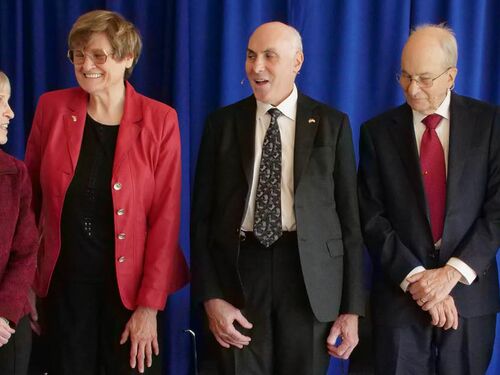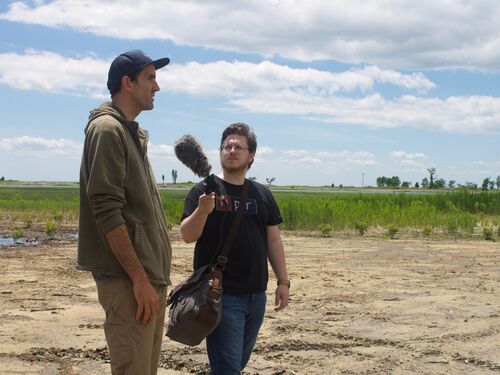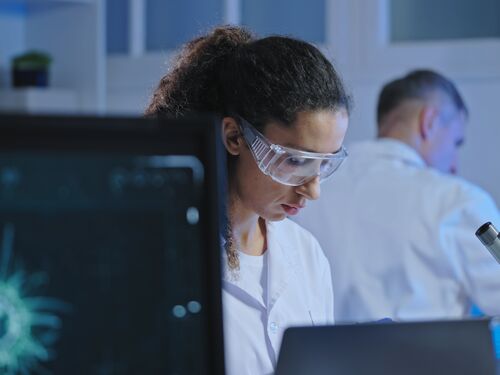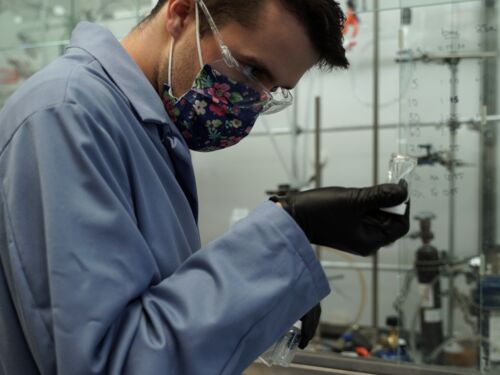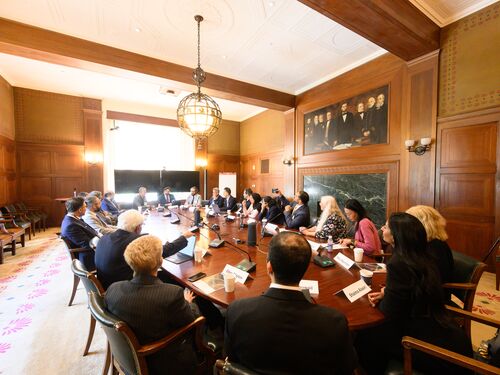A Celebration of U.S.-Based Nobel Prize Recipients Inspires Early Career Researchers
Feature Story
By Hannah Fuller
Last update November 16, 2023
The U.S.-based winners of three 2023 Nobel Prizes were honored on Nov. 14 at a scientific symposium hosted by the National Academy of Sciences and the Embassy of Sweden in Washington, D.C. The event, which took place at the embassy, provided the laureates with an opportunity to showcase their work and career paths — particularly to an audience of early career researchers who were among the attendees.
The laureates at the event were:
Moungi G. Bawendi and Louis E. Brus, who along with Aleksey Yekimov received the Nobel Prize in Chemistry for the discovery and synthesis of quantum dots, which have revolutionized everyday electronics and are used in lifesaving biomedical imaging.
Katalin Karikó and Drew Weissman, who received the Nobel Prize in Physiology or Medicine for their groundbreaking research on messenger RNA, which underpins the COVID-19 vaccines that have saved millions of lives.
Claudia Goldin, who received the Sveriges Riksbank Prize in Economic Sciences in Memory of Alfred Nobel for her pioneering work studying women in the workforce, uncovering the reasons for gender gaps in labor force participation and earnings.

Each of the laureates gave talks about their research and their career paths, describing the decades of work that led them to their achievements — along with the failures, frustrations, and setbacks along the way.
While their work spans a wide range of fields, the laureates found many similarities in their experiences. “All of us work because we’re curious. That’s what drives us,” said Claudia Goldin when asked about how she began her work as an economic historian.
“Of course, these prizes that we are recognizing today are all in the category of basic research, regardless of how soon they ended up creating actual, measurable products,” said NAS President Marcia McNutt, who helped open the symposium with remarks reflecting on the importance of the science enterprise in the U.S. “We need to once again become the most welcoming nation for the best and brightest scientists and support basic research.”

Many early career researchers in attendance described feeling moved by the laureates’ stories — and newly motivated to continue their own work. “It reminds you how important it is to advocate for science, and not just to do your work in a silo,” said Jamie Spangler, an assistant professor of biomedical engineering and chemical engineering at Johns Hopkins University and participant in past National Academies’ Frontiers of Science, Engineering, and Medicine symposia. “A big theme for me was the interdisciplinary nature of work. What we’ve seen over time with science is that it’s less about what one person can accomplish independently, and more about what we can accomplish together and all the cool stuff that happens at that intersection and through those nodes of connection.”
Grace McCarthy, who was a fellow in the Mirzayan Science and Technology Policy Graduate Fellowship Program and is currently a AAAS Fellow at the National Institutes of Health, noted that she was inspired by the years of work by Karikó and Weissman on mRNA vaccines — well before the COVID-19 pandemic. “Everything they talked about feels imminent today, but the research was decades ago. And so, it really inspires us to focus on what are we currently working on to figure out how that could shape our future — and what role policy can play in that.”
Deji Coker, a participant in past Frontiers symposia, was energized by the altruistic curiosity showcased by the Nobel laureates. “It was fascinating to see these scientists out there who are looking at their advancements to lift up other people around the globe. Their work started with trying to spread goodness around the world, and it leads to societal benefits for everyone else — the rising tide lifts all boats.”
More like this
Discover
Events
Right Now & Next Up
Stay in the loop with can’t-miss sessions, live events, and activities happening over the next two days.
NAS Building Guided Tours Available!
Participate in a one-hour guided tour of the historic National Academy of Sciences building, highlighting its distinctive architecture, renowned artwork, and the intersection of art, science, and culture.
